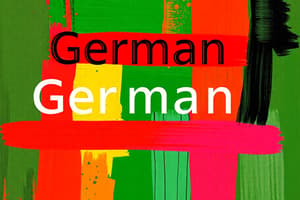Podcast
Questions and Answers
What is a significant challenge regarding German pronunciation according to its dialects?
What is a significant challenge regarding German pronunciation according to its dialects?
- Pronunciation remains consistent across all regions.
- Standardization is made difficult due to dialectal differences. (correct)
- Dialectal variations only affect written German.
- Standard German is less spoken in formal contexts.
Which of the following statements about umlauts in German is accurate?
Which of the following statements about umlauts in German is accurate?
- Umlauts create unique vowel sounds. (correct)
- Umlauts are only found in informal speech.
- Umlauts change consonant sounds.
- Umlauts have no impact on pronunciation.
How do regional dialects influence Standard German?
How do regional dialects influence Standard German?
- They provide grammatical rules for Standard German.
- They have no influence whatsoever.
- They can evolve Standard German vocabulary. (correct)
- They are always used in formal writing.
What role does the German language play in its culture?
What role does the German language play in its culture?
In what contexts is Standard German primarily used?
In what contexts is Standard German primarily used?
What grammatical categories does the German language distinguish between for nouns?
What grammatical categories does the German language distinguish between for nouns?
Which of the following best describes the German sentence structure?
Which of the following best describes the German sentence structure?
How many cases are there in German grammar?
How many cases are there in German grammar?
Which of the following is NOT a feature of the German language?
Which of the following is NOT a feature of the German language?
What influences the articles and adjectives used with nouns in German?
What influences the articles and adjectives used with nouns in German?
What aspect of German vocabulary is highlighted compared to English?
What aspect of German vocabulary is highlighted compared to English?
Which of the following statements is true about German pronunciation?
Which of the following statements is true about German pronunciation?
Which of the following features is associated with the German grammatical system?
Which of the following features is associated with the German grammatical system?
Flashcards
German Dialect Variations
German Dialect Variations
German pronunciation varies across different regions, leading to different interpretations of spoken German.
German Umlauts
German Umlauts
German has distinct sounds like "ä", "ö", and "ü", which are not found in English.
German Pronunciation Rules
German Pronunciation Rules
The pronunciation of a word can change based on the surrounding words and letters.
German Language and Art
German Language and Art
Signup and view all the flashcards
German Language and Cultural Preservation
German Language and Cultural Preservation
Signup and view all the flashcards
What language family does German belong to?
What language family does German belong to?
Signup and view all the flashcards
How many people speak German natively?
How many people speak German natively?
Signup and view all the flashcards
Where is German spoken?
Where is German spoken?
Signup and view all the flashcards
What are some of the grammatical challenges in German?
What are some of the grammatical challenges in German?
Signup and view all the flashcards
What are noun genders in German?
What are noun genders in German?
Signup and view all the flashcards
What is the basic sentence structure of German?
What is the basic sentence structure of German?
Signup and view all the flashcards
What are strong and weak verbs in German?
What are strong and weak verbs in German?
Signup and view all the flashcards
What makes German pronunciation difficult for non-native speakers?
What makes German pronunciation difficult for non-native speakers?
Signup and view all the flashcards
Study Notes
German Language Overview
- German is a West Germanic language, spoken natively by approximately 100 million people worldwide.
- It's an official language in Germany, Austria, Switzerland, and Liechtenstein.
- It's also spoken in parts of Belgium and Italy.
- German belongs to the Indo-European language family.
- German's highly inflected nature means its words change form based on grammatical function.
- German grammar is complex, including noun cases, genders, auxiliary verbs, and complex verb conjugation.
- German distinguishes three grammatical genders (masculine, feminine, neuter) for nouns, affecting articles and adjectives used with them.
German Grammar
- German uses a Subject-Verb-Object (SVO) sentence structure, similar to English.
- German nouns have four cases (nominative, accusative, dative, genitive), impacting how articles and adjectives agree with nouns.
- The article (der, die, das) and adjective gender (masculine, feminine, neuter) change according to noun case.
- German verbs have strong and weak conjugations, requiring different forms for persons and tenses.
- German tenses include present, past, future, perfect, and pluperfect.
- German has a standardized system for pronouns, varying by number, gender, and case.
- While German word order is largely fixed, exceptions exist to convey specific concepts. These exceptions add nuances to sentence structure.
German Vocabulary
- German vocabulary derives from Latin, Old High German, and Middle High German.
- German has borrowed words from various languages over time.
- This diverse origin significantly shapes modern German vocabulary.
- German is a largely inflected language, where word forms change based on function, contrasting with English's relative consistency.
- German vocabulary is often precise, needing distinct words for concepts sometimes expressed in more general terms in other languages.
German Pronunciation
- German pronunciation is challenging for non-native speakers due to its consonant and vowel system.
- Consonant sounds and clusters differ between dialects, affecting interpretation.
- German phonology includes distinctive vowel sounds and diphthongs with rules shaping pronunciation.
- German pronunciation variations exist between dialects, causing standardization challenges.
- German uses umlauts (ä, ö, ü), unique vowel sounds.
- Pronunciation rules depend on the surrounding sounds and their relationship to neighboring letters.
German Dialects
- German is spoken in various regional dialects.
- These dialects differ significantly in pronunciation, grammar, and vocabulary.
- Some dialects influence German regional culture.
- Dialects are frequently employed in informal speech, impacting the vernacular.
- Standard German is used for formal communication, education, literature, and media.
- Dialects can influence vocabulary development and regional awareness.
German Culture and Language
- German culture is influenced by its complex history of social development and political events.
- German reflects a rich literary and intellectual heritage.
- The German language is used to express philosophical, scientific, and artistic ideas.
- German cultural production plays a significant historical role, fostering intellectual development.
- German language serves as a means of cultural preservation for various groups.
Studying That Suits You
Use AI to generate personalized quizzes and flashcards to suit your learning preferences.




